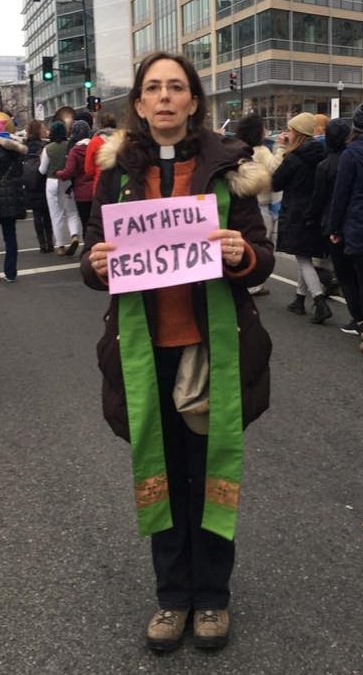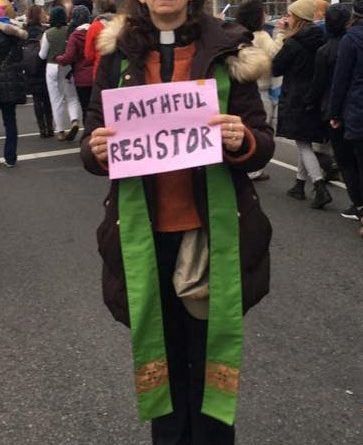Nonviolence in place of Gun Violence by Margery A. Rossi
 What I remember most vividly is my horror at the idea that I might even consider shooting my sister.
What I remember most vividly is my horror at the idea that I might even consider shooting my sister.
I was 7 years old, she was 8.
She liked to boss me around; I didn’t comply without a fight.
On this particular day, we had been bickering incessantly and my mother was at her wit’s end. When nothing else worked to interrupt our endless arguments, my mother emptied the bullets from my father’s revolver, walked in to the room where we continued to shout at each other, held it out between us and said, “if you hate each other so much, just end it!”
We stared at her in shocked silence. I remember thinking that no matter how mad I was, I did not want to touch that gun.
This incident may help explain my lifelong aversion to guns, along with the fear, grief, death and trauma they cause in wars, mass shootings and countless smaller incidents every day. I have worked for years opposing war, teaching peace and social justice. And then, in January 2011, in the wake of the shooting of Gabrielle Giffords and 18 other people, I asked my friend, Rick Ufford-Chase, what our small congregation in Stony Point, NY might do to respond. He handed me the recently published PC(USA) policy document, Gun Violence, Gospel Values: Mobilizing in Response to God’s Call. It articulated in clear and concise theological language everything I had ever believed about gun violence, and how we are called to respond as followers of Jesus, the Prince of Peace. I could sit on the sidelines no longer, simply offering my “thoughts and prayers.” It was time for me to act. This defining moment helped to propel me from leading a small congregational study about gun violence to speaking out at vigils, organizing regional conferences, co-authoring an overture to the General Assembly, and now, serving as moderator for the national Presbyterian Peace Fellowship Gun Violence Prevention Working Group (PPFGVP).
Meanwhile, after all the terrible incidents over the past 7 years, thousands and thousands of gruesome deaths and injuries[1], policy statements and an overture encouraging churches to declare their property gun-free zones, gun violence remains largely taboo – “too political” to discuss in many churches.
Our small, faithful PPFGVP group is working hard to change that, recognizing that the work of nonviolent action is not all protest marches and civil disobedience. Presbyterians can only join the public discourse and take action for change after understanding the theological and pastoral issues involved in gun violence, and then learning how to initiate, elevate and manage the “creative tension” so necessary for growth – which is the intention of nonviolent resisters seeking to confront a taboo, according to Dr. King, in his “Letter from a Birmingham Jail.” [2]
We began by laying the groundwork for nonviolent direct action; taking on the quiet, behind-the-scenes work so necessary to organizing and strategizing. Just this year, we:
- updated and published the Congregational Toolkit for Gun Violence Prevention to provide educational, pastoral and action resources to congregations and individuals
- worked with the Presbyterian Peacemaking Program to design and publish “No Guns in God’s House” signs
- kicked off a campaign to find 100 churches this year to lead the denomination in posting these signs as a bold, nonviolent witness against gun violence
- and now, we are developing a national nonviolent witness against gun violence in recognition of the 5th anniversary of the Sandy Hook shootings on December 14, 2017 in collaboration with denominational staff. (Keep watch for more on this!)
Now that this part of the work is well underway, we need to build a coalition. We need to find and bring together folks who are willing to choose nonviolence in place of gun violence – and witness to that stance by placing signs on their property and policies in their session books. We need to find the folks who roll up their sleeves and commit to this work – the long, hard, disciplined work of transformative education, loving pastoral care, compassionate support for the grieving, relentless advocacy; so that step by incremental step, we replace gun violence with Nonviolence for the healing of our nation. Will you join us?
Download the Congregational Toolkit and signs for free here: http://www.presbypeacefellowship.org/gun-violence/resources#.Wbmvf2eWzIU
You may well ask: “Why direct action? Isn’t negotiation a better path?” You are quite right in calling for negotiation. Indeed, this is the very purpose of direct action. Nonviolent direct action seeks to create such a crisis and foster such a tension that a community which has constantly refused to negotiate is forced to confront the issue. It seeks so to dramatize the issue that it can no longer be ignored. My citing the creation of tension as part of the work of the nonviolent resister may sound rather shocking. But I must confess that I am not afraid of the word “tension.” I have earnestly opposed violent tension, but there is a type of constructive, nonviolent tension which is necessary for growth.
— Reverend Dr. Martin Luther King, Jr., in Letter from a Birmingham Jail
Whether as a pastor, youth minister, chaplain, program director, retreat leader or grant writing consultant, Margery Rossi’s driving principle remains the same: to be a catalyst, to spark meaningful engagement and change for the common good. For the past two years, she has served as the pastor of First Presbyterian Church of Wappingers Falls, NY. Previously, Margery was the pastor at the Stony Point Presbyterian Church. She is active in Hudson River Presbytery and was Moderator in 2012. She has been involved in regional, national and international mission work and partnership efforts in gun violence prevention, peacemaking and church change. Currently she moderates the Presbyterian Peace Fellowship Gun Violence Prevention Working Group.
[1] http://www.gunviolencearchive.org/past-tolls
[2] http://www.africa.upenn.edu/Articles_Gen/Letter_Birmingham.html

